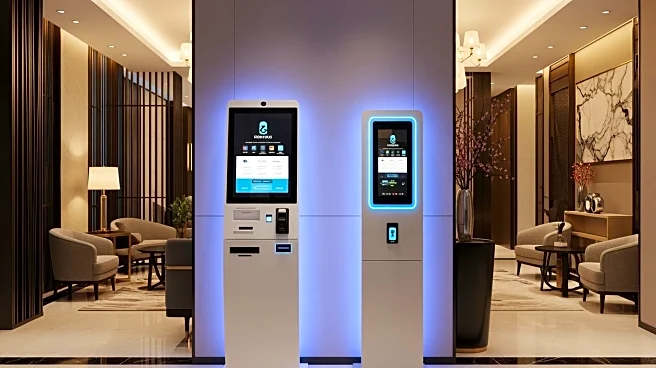What's Happening?
Jessica Gillingham, founder and CEO of Abode Worldwide, has released a new book titled 'Tech-Enabled Hospitality,' which explores the transformative impact of technology on the hospitality industry. The
book compiles insights from over thirty-eight leaders in technology and hospitality, offering a comprehensive perspective on how digital advancements are reshaping guest experiences and operational delivery. Gillingham emphasizes that the integration of technology in hospitality is not merely a technical upgrade but a cultural and strategic shift. The book discusses how technology can enhance personalization and trust, rather than detract from the human element of hospitality. Examples include allowing guests to opt into room cleaning, which can improve efficiency and customer satisfaction. The discussion also highlights the convergence of traditional hospitality categories, such as hotels and rental units, as guests increasingly seek convenience and authentic experiences.
Why It's Important?
The insights provided in 'Tech-Enabled Hospitality' are significant as they address the evolving expectations of modern guests and the need for the hospitality industry to adapt. The integration of technology offers both opportunities and challenges, as operators must balance automation with maintaining a personal touch. The book's emphasis on leadership-driven change underscores the importance of strategic vision in successfully implementing technological innovations. As the industry faces rapid advancements in tech stacks, artificial intelligence, and platform interoperability, the ability to harness these tools effectively can lead to enhanced guest experiences and operational efficiencies. This transformation is crucial for hospitality businesses aiming to remain competitive and meet the demands of a tech-savvy clientele.
What's Next?
As the hospitality industry continues to evolve, operators are likely to focus on further integrating technology to enhance guest experiences. This may involve adopting more sophisticated data analytics to better understand guest preferences and improve service delivery. Additionally, the industry may see increased collaboration between technology providers and hospitality businesses to develop innovative solutions that address specific operational challenges. The ongoing convergence of hospitality categories suggests that businesses will need to remain flexible and responsive to changing consumer preferences. Leadership within the industry will play a critical role in guiding these transformations and ensuring that technology serves to elevate, rather than replace, the human aspects of hospitality.
Beyond the Headlines
The cultural shift towards tech-enabled hospitality raises important ethical and operational considerations. As technology becomes more integrated into guest experiences, issues such as data privacy and security will become increasingly important. Hospitality operators will need to ensure that they are transparent about data usage and that robust security measures are in place to protect guest information. Additionally, the balance between automation and human interaction will require careful management to ensure that the personal touch that defines hospitality is not lost. The industry's ability to navigate these challenges will be crucial in maintaining guest trust and satisfaction.








